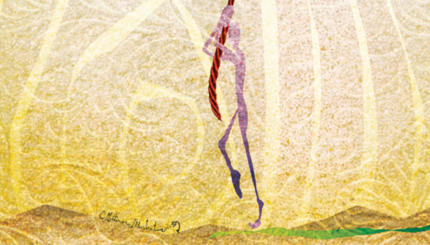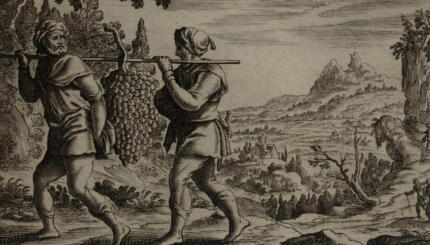Jews read sections of the Torah each week, and these sections, known as parshiyot, inspire endless examination year after year. Each week we will bring you regular essays examining these portions from a queer perspective, drawn from the book Torah Queeries: Weekly Commentaries on the Hebrew Bible and the Torah Queeries online collection. This week, Jay Stanton New considers how LGBTQ Jews, like the ancient Israelites, must overcome their fears of being few in number.

In the beginning of this week’s Torah portion, Shelach Lecha, God commands Moses to send twelve scouts to the land of Canaan on a reconnaissance mission. They are charged with the task of assessing the land and reporting back to Moses and the community about the resources of the land and the people who inhabit it. Giving their report after returning from their mission, they state that the land is filled with milk and honey, but the people who inhabit it are large and numerous. Caleb, one of the scouts, assures the people that, despite the difficulties, the Israelites will be able to conquer the land. Ten other scouts make a comment, which I will share below, about how small they are, while asserting the unwise nature of Caleb’s conclusion. Hearing fear in the voices of these eye-witnesses, the Israelite community exclaims the wish that they had died in Egypt. Upon hearing the Israelite’s comment, Caleb and Joshua (another of the scouts) rend their clothes in a passionate gesture of mourning, and implore the Israelites not to rebel against Moses and God. In response, God threatens to wipe out the Israelites. Moses pleads with God on behalf of the Israelite people, and G-d agrees to stay his hand. Instead of this immediate retribution, G-d decrees that all the adults of this faithless generation die out in the wilderness so that a new generation, one more like Joshua and Caleb (who were excepted from God’s decree), could advance to the Promised Land.
We saw the Nephilim there – the Anakites are part of the Nephilim – and we looked like grasshoppers to ourselves, and so we must have looked to them. (Num. 13:33, JPS)
These words offer a snapshot into human nature. When hearing that a task is difficult, how often do we respond to a challenge by convincing ourselves we are inadequate to the task ahead? This portion plays on universal tendencies to underestimate ourselves and let our worries overtake our reason. It is all too easy to see the courage of Caleb, and yet to identify with the concerns of the ten scouts.
We, as people, as Jews, and as members of the LGBTIGQQ community, are often afraid. We have good reason to be; in life, there are many threats. As queers and especially as Jewish queers, we know that some people wish to do us harm. This is the fear expressed in the scouts’ comment about being grasshoppers. How can we, such a small group of people, ever face a group of people bigger in size and numbers than we are? How can we have Caleb’s courage to go forward, despite the odds? The task of overtaking the land of Canaan, a sure thing that God promised the Israelites, suddenly becomes impossible when the scouts take a look at the people who inhabit the land. They, like many of us, fear failure. But more than fearing failure on their own part, they fear failure because of a lack of signs from God.
Clearly, given the circumstances, some sort of ot (sign) would have been appreciated. A sign, any sign, would have been reassuring. However, none was given. That does not mean that God wasn’t with the Israelites. We learn that “K’vodo malei olam,” God’s glory fills the entire world. We shouldn’t need a sign – God’s presence fills creation – and in this case, God’s word speaks for itself. But sometimes we feel we are alone without a sign. A sign to signify what jobs we should take, when to come out, or even what college major we should choose, would help us get through life’s challenges. Of course, we wouldn’t grow as much.
The ten scouts also perceived themselves as small. They saw themselves as grasshoppers compared to the people of the land. This perception is reasonable. How can we argue with the way one sees oneself in comparison to others? When I first came to the University of Chicago, I thought myself inferior to other students because they had read more of the classics, and they knew what words like “epistemology” meant, before entering college. I knew I had some catching up to do, and I feared I would be unequal to the task. However, in the classroom setting, I realized that more important than what you have been taught is how you think (you can always read a little extra). The situation with the scouts is similar: they perceive themselves to be less than those who inhabit the land because those who inhabit the land are more sure of themselves in the land; they have more experience being there.
The ten scouts perceived themselves as grasshoppers in comparison to the huge Anakites. We do not need to dispute this claim. Maybe the scouts were scrawny in comparison to the Anakites. If not in “reality,” it’s certainly how they imagined themselves. If they were smaller, and even if they simply imagined themselves to be smaller, they had reason to fear. However, the next step in their logic is problematic.
The scouts go on to say that they “must have looked” like grasshoppers to the Anakites. This step in their logic seems based solely on projection – the kind of imagination that produces monsters under the bed. As humans, we are not blessed with the ability to read minds. We can anticipate, after much practice, the actions of people we know, but we cannot know exactly what is going through their heads. All the more so, we cannot know what goes through the heads of people with whom we have never interacted.
Presumptuous and counterproductive, assuming the thoughts of another is rarely fruitful. Instead, it tends to reduce the imaginer to a childlike state. Lawrence Kushner, in the book Five Cities of Refuge, recounts a teaching of the Kotzker Rebbe:
Menahem Mendl Morgenstern of Kotzk says that it’s all right to say you feel like a grasshopper in your own eyes–that means you’re alert–but when you start guessing what you look like to someone else, you’ve given them permission to define you, so you’re still a child. For this reason, Caleb, who refuses to let anyone else define him, is a man and, along with Joshua, was one of only two men of the wilderness generation to live to enter the Promised Land.
The ten scouts are nervous, letting others define them; they have not yet trusted their own definitions for themselves. Caleb, in contrast, is strong and independent, letting no one else define him. Repeatedly asserting his stance on the subject at hand, he refuses to pass as someone he’s not.
If as a people, LGBTIGQQ Jews were to take Caleb’s actions to heart, we would follow his example of strength and independence. Stepping up to the challenges of our times, as queer Jews, allows us to grow as a people, especially if we employ hopeful imaginings or strength and pride rather than frightening projections of powerlessness. And then, like Caleb, (no matter the gender with which we identify) we will be menschen.
Torah
Pronunced: TORE-uh, Origin: Hebrew, the Five Books of Moses.


